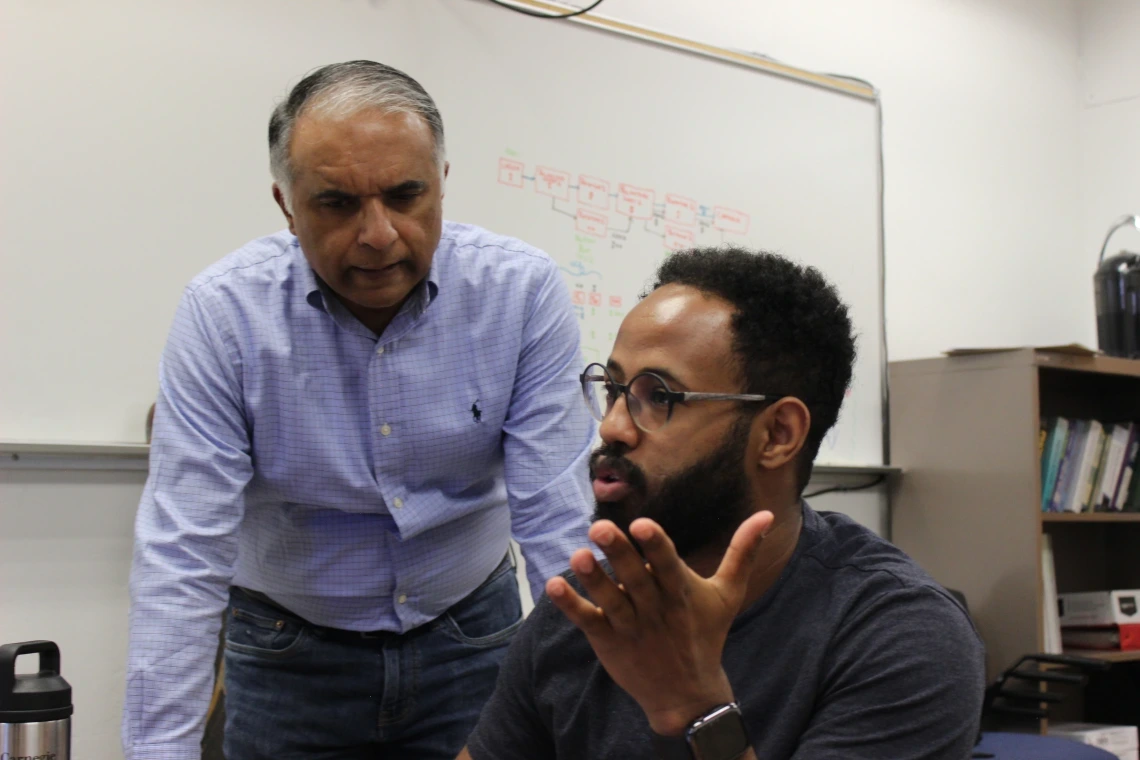Two U of A innovators elected to the National Academy of Inventors

Left to right: Abhijit Mahalanobis with doctoral student Natnael Daba.
U of A College of Engineering
Two University of Arizona faculty members have been elected fellows of the National Academy of Inventors: Shibin Jiang, an adjunct research professor in the James C. Wyant College of Optical Sciences, and Abhijit Mahalanobis, an associate professor of electrical and computer engineering in the College of Engineering.
Both Jiang and Mahalanobis have developed influential inventions that have significantly impacted their fields.
"Being elected to the National Academy of Inventors is a distinguished honor recognizing both technical innovation and its impact in the world," said university President Suresh Garimella, who is also a fellow of the NAI. "The work that merits membership as a fellow of the NAI reflects our mission as a land-grant university and I'm proud to see two colleagues joining the academy this year."
Being elected an NAI fellow represents the highest professional honor granted by the organization, exclusively available to academic inventors.
"The selection of Dr. Shibin Jiang and Dr. Abhijit Mahalanobis as fellows of the National Academy of Inventors reflects their remarkable achievements in turning ideas into impactful solutions that serve society and inspire the next generation of inventors," said Tomás Díaz de la Rubia, senior vice president of research and innovation. "We are proud to see their contributions recognized at this distinguished level and will continue to support a culture of ingenuity and excellence at the University of Arizona."
"The University of Arizona excels in many areas, but the commitment of faculty to moving inventions from the lab to the world impresses me every day," said Doug Hocskstad, associate vice president of Tech Launch Arizona, the U of A office that commercializes inventions stemming from university research and innovation. "We are honored and humbled by these faculty and excited to help move innovations to the world."
Shibin Jiang: Photonics pioneer

Shibin Jiang
Jiang has been recognized globally as a pioneer in photonic glasses, fiber amplifiers and lasers, and he holds 52 U.S. patents. His academic contributions include editing 40 books and eight special journal issues and publishing 98 papers in peer-reviewed journals.
As an entrepreneur, he founded or co-founded several companies, including NP Photonics, AdValue Technology, AdValue Photonics and Arizona Industrial Lasers. He developed erbium (Er3+)-doped phosphate glass fiber, enhancing fiber's ability to amplify light. The technology was licensed to NP Photonics. His patents in fibers enhanced with rare-earth elements have enabled the creation of high-peak-power fiber amplifiers and lasers able to deliver high power in short pulses, which are integral to ultrafast lasers, wind detection, space applications and coherent lidar able to determine an object's velocity and distance.
Jiang thanked the Wyant College of Optical Sciences, the U of A, the staff members of his startups, and his wife and family for their support and contributions to his success.
"It was the hard work of the scientists, engineers and technicians I worked with that earned me this significant award," he said. "I surely will continue to work hard, hoping to produce more useful inventions and creative works to make a little bit of a contribution to the society and humankind."
Abhijit Mahalanobis: Aerospace and defense innovator
Mahalonobis' research focuses on video and image processing for defense applications and weapons and sensor systems, especially automatic target recognition. He has over 190 journal and conference publications, holds six patents, co-authored a book on pattern recognition, contributed several book chapters, and edited special issues of several journals. He completed his undergraduate degree with honors at the University of California, Santa Barbara in 1984. He then joined Carnegie Mellon University and received a master's degree and doctorate in 1985 and 1987, respectively.
Before joining the U of A in 2022, Mahalanobis was an associate professor at the Center for Research in Computer Vision at the University of Central Florida and a senior fellow at Lockheed Martin in Orlando. He has also worked at Raytheon and Lockheed Martin, has partnered with several small businesses on projects with the U.S. Army and Navy, and was a faculty member at the University of Maryland. After working in the defense industry for many years, Mahalonobis said, he returned to academia to prepare the next generation of aerospace and defense engineers.
"I am humbled and deeply honored to be recognized by the NAI as a fellow," Mahalanobis said. "I am immensely grateful to my nominators, referees and the NAI selection committee. In this capacity, I hope to foster creativity in our students, and contribute to innovative solutions for challenging problems in my areas of research."
Jiang and Mahalonobis join 18 other current and former U of A faculty members who have been elected NAI fellows.
The two will be honored alongside the rest of the NAI 2024 class of fellows during the academy's 14th annual conference on June 26 in Atlanta, where they will be presented medals by a senior official of the U.S. Patent and Trademark Office. The 2024 class includes 170 members from 135 research universities and governmental and nonprofit research institutions worldwide.

